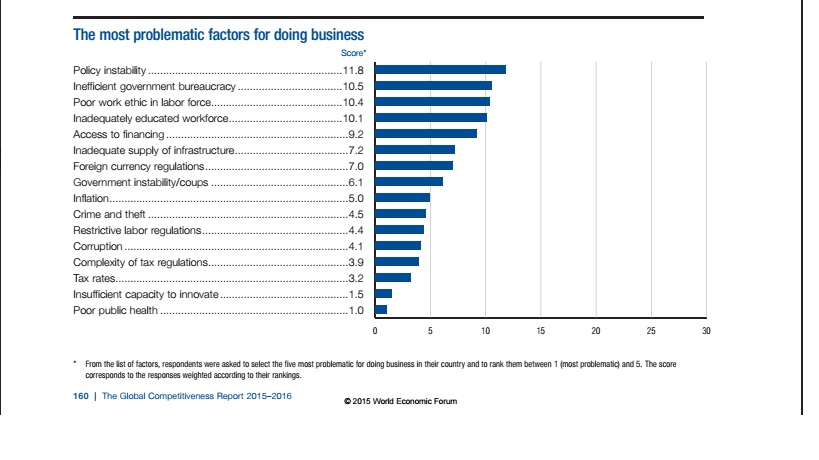Latest NEWS
- Aswat Masriya, the last word
- Roundup of Egypt's press headlines on March 15, 2017
- Roundup of Egypt's press headlines on March 14, 2017
- Former Egyptian President Hosni Mubarak to be released: lawyer
- Roundup of Egypt's press headlines on March 13, 2017
- Egypt's capital set to grow by half a million in 2017
- Egypt's wheat reserves to double with start of harvest -supply min
- Roundup of Egypt's press headlines on March 12, 2017
Egypt moves up three places in WEF Global Competitiveness Report

By Hend Kortam
CAIRO Sept 30 (Aswat Masriya) - Egypt ranked 116, up from 119 last year, in the World Economic Forum's annual Global Competitiveness Report, the first improvement since the 2011 uprisings swept across the Arab World.
The 2015-2016 Report assesses the competitiveness of 140 countries, based on their overall scores on 113 indicators. Last year's report, in which Egypt ranked 119, compared 144 countries.
Margareta Drezniek Hanouz, one of the report's authors, told Aswat Masriya in a telephone interview that even if there were 140 countries last year, "Egypt would have been stable," meaning that Egypt would have still ranked 116th if there were fewer countries.
On the Global Competitiveness Index, which makes assessments on a scale from one to seven, Egypt has averaged an overall 3.66, only a few points higher than the 3.60 registered in the 2014-2015 report.
The 400-page report shows a rise in the level of public trust in politicians, compared to last year and cites "a more efficient judiciary in settling business disputes".
It also suggests that Egypt has improved on all three indicators related to the judiciary, judicial independence, the efficiency in settling legal disputes and the efficiency in challenging regulations.
Hanouz said these findings were based on a survey answered by business executives in Spring 2015.
Although Egypt continues to face an escalating militant insurgency, the report suggests that the country has improved on all four security-related indicators.
Compared to the 2014-2015 report, Egypt has moved up from 127 to 122 in organised crime and climbed one spot to 110 in the reliability of police services indicator.
There is also an improvement in both the business cost of terrorism and the business cost of crime, where Egypt has ascended to 138 and 127 respectively, compared to the previous year.
Hanouz said even though these security indicators are only four of 113, they are very important for a country that is "reliant on tourism."
But the report still does consider physical security "an important hindrance to economic growth," despite the improvements.
Egypt's top challenging factors according to the report are policy instability and inefficient government bureaucracy. Foreign currency regulation, government instability and access to financing are also listed among the problematic factors for doing business in Egypt.
In nearby Tunisia, the report finds, similarly, that inefficient government bureaucracy and policy instability to be two of the three top problematic factors to doing business. Corruption is also high on the list in Tunisia.
Although reforms have helped prop Egypt upwards, there is still a pressing need for the densely populated country to carry out "continued reforms," the report recommended, to "create favorable conditions for private-sector growth" and achieve "more openness to trade and investment."
Hanouz said there are a number of areas that should be addressed in Egypt to improve market efficiency, such as "reducing red tape." This would send the message that reforms are being made and would "liberate growth," she said.
This year's report draws attention to the link between growth and equity and how both developing and advanced economies are "subscribing more and more to the notion of inclusive growth," amid a growing debate on the relationship between "competitiveness and inclusiveness."
The report "finds a close link between competitiveness and an economy’s ability to nurture, attract, leverage and support talent."
In terms of how much Egypt is finding the balance between competitiveness and equity, Hanouz said that while Egypt is preforming well in some areas like access to education and health services, the country is still "a work in progress."
In the Middle East and North African (MENA) region, the best performing countries are oil-rich Gulf states Qatar and the United Arab Emirates, which ranked 14 and 17, respectively.
Compared to the Gulf, there are large strides to be made for North African countries, where the highest ranking country, Morocco, ranks 72nd globally. It has a 4.17 score on the Global Competitiveness Index.
Egypt is outranked by other neighbours in North Africa such as Algeria and Tunisia, coming in 87th and 92nd place, respectively. Tunisia's ranking comes after positive developments in the country were undermined by "terrorist events".
Libya, which has been engulfed in turmoil caused by warring factions, could not be included in the report due to absence of data.
"Rising geopolitical security concerns made it impossible to cover Yemen, Syria, or Libya in this year’s report," the authors explain.
The MENA region is "marked by fragility and vulnerability to shocks," despite progress in the competitiveness of most countries.
Both Egypt and Tunisia are placed in the middle stage of development and are labeled efficiency-driven economies. This is a group of 31 countries that includes China, Indonesia and South Africa.
Overall, "countries in the [MENA] region must focus on reforming the business environment and strengthening the private sector," the report reads.
It adds that even though economies in the region are diverse, most of countries in the region "share the major—and daunting— challenge of creating sufficient employment opportunities for youth."
On a global scale, the report finds that there is a "failure to embrace long-term structural reforms" that boost productivity and entrepreneurial talent, which is "harming the global economy’s ability to improve living standards," lower unemployment and "generate adequate resilience for future economic downturns."
Switzerland tops the Global Competitiveness Index this year for the seventh year in a row. It is followed by Singapore, which maintained 2nd place and the U.S. in third place.










